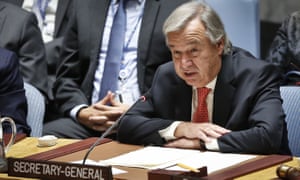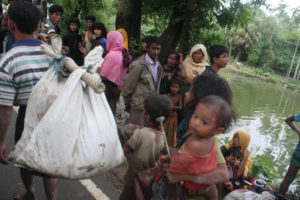
The UN secretary general, António Guterres, has urged Myanmar’s authorities to immediately end military operations that have sent more than 500,000 Rohingya Muslims fleeing to Bangladesh, calling the crisis “the world’s fastest developing refugee emergency and a humanitarian and human rights nightmare”.
Guterres warned that the humanitarian crisis was a breeding ground for radicalisation, criminals and traffickers. And he said the broader crisis “has generated multiple implications for neighbouring states and the larger region, including the risk of inter-communal strife”.
He told the UN security council at its first open meeting on Myanmar since 2009 that government authorities must also allow “unfettered access” for humanitarian aid and ensure “the safe, voluntary, dignified and sustainable return” of all those who sought refuge across the border.
The current crisis erupted on 25 August, when an insurgent Rohingya group attacked police posts in Myanmar’s Rakhine state, killing a dozen security personnel – an act that Guterres again condemned.
The attacks prompted Myanmar’s military to launch “clearance operations” against the rebels, setting off a wave of violence that has left hundreds dead, thousands of homes burned and the mass flight of Rohingya to Bangladesh.
Guterres previously called the Rohingya crisis “ethnic cleansing”. He didn’t use those words on Thursday but he referred to “a deeply disturbing pattern to the violence and ensuing large movements of an ethnic group from their homes”.
He cited Rathedaung township, where three-quarters of the Rohingya population have fled and most villages and all three camps for displaced people have been burned to the ground.
Meanwhile, at least 15 people drowned and scores are feared missing after a boat carrying Rohingya families capsized off the coast of Bangladesh on Thursday.
Witnesses and survivors said the vessel overturned just metres from the coast in rough waters, after it was lashed by torrential rain and high winds.
“They drowned before our eyes. Minutes later, the waves washed the bodies to the beach,” said Mohammad Sohel, a local shopkeeper.
The United Nations’ humanitarian office said on Thursday that the number of Rohingya Muslims fleeing to Bangladesh since 25 August has topped 500,000. A UN spokesman, Farhan Haq, called it “the largest mass refugee movement in the region in decades”.
Bangladesh was already hosting thousands of Rohingya, and Haq said there are now believed to be “well over 700,000” Rohingya in the country.
“The failure to address this systematic violence could result in a spillover into central Rakhine, where an additional 250,000 Muslims could potentially face displacement,” Guterres warned.
Rohingya “are outnumbered by Rakhine communities, some of whom have engaged in violent acts of vigilantism against their Muslim neighbours”, he said.
Guterres also expressed deep concern at “the current climate of antagonism” by Burmese authorities toward the UN and humanitarian groups that provide desperately needed aid. In the past few days, he said, the government has said repeatedly that “it was not the time” for unhindered humanitarian access to resume.
“It is imperative that UN agencies and our non-governmental partners be granted immediate and safe access to all affected communities,” he said.
The article appeared in the U.N. News Centre on 28/09/2017

